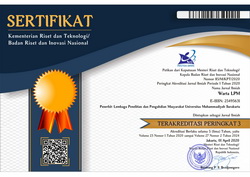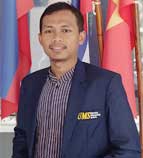Pemberdayaan Guru Sekolah Dasar Muhammadiyah dalam Pembudayaan Literasi Numerasi Era Pandemi Covid-19
DOI:
https://doi.org/10.23917/warta.v26i1.621Keywords:
Numerasi, Literasi, Sekolah Dasar, PemberdayaanAbstract
Numeracy is a strong foundation for attitude and action during the Covid-19 period. The cultivation of numeracy literacy at SD Muhammadiyah PK Boyolali has not met expectations. There are three objectives of this activity. 1) Teachers master the strategy of cultivating numeracy literacy. 2) The teachers apply the strategy of cultivating numeracy literacy well, students are happy and accustomed to learning numeracy literacy. 3) There is an increase in students' numeracy literacy skills. The activity was carried out at SD PK Boyolali and Banyudono Boyolali, January-June 2021. Participants were 25 teachers and 114 students. The implementation method goes through three stages, namely workshops, implementation assistance and assessment. Results of the activity: 1) The teachers mastered the strategy of cultivating numeracy literacy well, shown in the learning tools. 2) The teachers apply the strategy of cultivating numeracy literacy by a) getting used to various strategies for various questions, b) giving enough time to try questions, c) inviting them to solve problems in other ways, d) inviting them to look at other possibilities, e) when facing difficult problems not avoided but using time to repeat and work on more questions, and f) flexibility in problem solving. The students are happy and accustomed to learning numeracy literacy by, a) practicing consistently, disciplined and continuously, b) studying mathematics material outside the school curriculum, c) avoiding looking at answers before trying to work on questions, d) practicing writing down answers systematically, and e) try to solve the problem in another way. 3) There is an increase in students' numeracy literacy skills, both in personal, socio-cultural, and scientific contexts.
Downloads
References
Adnjani, M. D., Kurdaningsih, D. M., & Mulyadi, U. (2021). Pendampingan Literasi Digital Kampung KB RW 2 Kelurahan Gedawang Banyumanik Kota Semarang. Warta LPM, 24(2), 167–175. https://doi.org/10.23917/warta.v24i2.10705
Astuti, N. K., Fahinu, & Maasuha, J. (2018). Analisis Kemampuan Literasi Matematika Siswa Kelas VIII SMP Swasta di Kota Kendari. Penelitian Pendidikan Matematika, 6(1), 99–112.
Chrysostomou, M. (2011). Cognitive Styles and Their Relation to Number Sense and Algebraic Reasoning. Proceedings of the Seventh Congress of the European Society for Research in Mathematics Education, 387–396.
Dewantara, & Harpeni, A. (2019). Soal Matematika Model Pisa: Alternatif Materi Program Pengayaan. DIDAKTIKA?: Jurnal Kependidikan, 12(2), 197–213. https://doi.org/10.30863/didaktika.v12i2.186
Fakhriyan, D., Mardiyana, & Aryuna, D. R. (2018). Analisis Kemampuan Literasi Matematika dalam Memecahkan Masalah Model Programme For International Student Assessment (PISA) pada Konten Perubahan dan Hubungan Ditinjau dari Kecerdasan Logis Matematis Siswa Kelas IX SMP Muhammadiyah Program Khusus Surakart. Jurnal Pendidikan Matematika Dan Matematika, 2(6), 421–434.
Hewi, L., & Shaleh, M. (2020). Refleksi Hasil PISA (The Programme For International Student Assesment): Upaya Perbaikan Bertumpu Pada Pendidikan Anak Usia Dini). Jurnal Golden Age, 4(01), 30–41. https://doi.org/10.29408/jga.v4i01.2018
Katoningsih, S. & S. (2020). Needs Analysis of Potential for Early Childhood Educators as Agents of Teacherpreneurship in Karanganyar. International Journal of Innovation, Creativity and Change, 12(6), 123–134.
Kurniawan, G. I., & Dagustani, D. (2021). Literasi Berpikir Kreatif dan Pengenalan Program Santripreneur di Pesantren Miftahul Jannah. Warta LPM, 24(3), 571–580. https://doi.org/10.23917/warta.v24i3.12637
Muzaki, A., & Masjudin. (2019). Analisis Kemampuan Literasi Matematis Siswa. Mosharafa: Jurnal Pendidikan Matematika, 8(3), 493–501.
Novitasari, M., Narimo, S., Fajri, D. N., & Raisia, A. (2022). Critical Thinking Skills Through Literacy and Numeration Oriented Mathematics Student Worksheet. Jurnal Basicedu, 6(4), 5775–5784. https://doi.org/10.31004/basicedu.v6i4.3173
OECD. (2017). PISA 2015 Assessment and Analytical Framework: Science, Reading, Mathematic, Financial Literacy and Collaborative Problem Solving. In OECD.
Prasetiyo, W. H., Sari, B. I., Rahmawati, N., & Pambudi, G. (2022). Peningkatan Kompetensi Digital bagi Guru Muhammadiyah dalam. Jurnal Warta LPM, 25(1), 91–100.
Prastiti, T. D. (2009). Implementasi Realistic Mathematics Education Dengan Memperhatikan Gaya Kognitif Siswa Dan Pengaruhnya Terhadap Kemampuan Komunikasi Dan Pemecahan Masalah Matematika SMP. Jurnal Pendidikan Dan Pembelajaran, 16(1).
Setyaningsih, N., Rejeki, S., & Ishartono, N. (2019). Developing Realistic and Child-friendly Learning Model for Teaching Mathematics. JRAMathEdu (Journal of Research and Advances in Mathematics Education), 4(2), 79–88. https://doi.org/10.23917/jramathedu.v4i2.8112
Subanji, S. (2012). Pengembangan Aktivitas Matematika Problem Solving Mengacu Pada Meaning Based Approach. J-TEQIP, 3(2).
Sutama, Prayitno, H., Narimo, S., & Sari, D. (2019). Cognitive Ability of High School Students in Level of Thinking based on Bloom’s Taxonomy Viewed from Intrapersonal Intelligence. Proceedings of the First International Conference on Science, Technology and Multicultural Education. https://doi.org/10.4108/eai.25-6-2019.2294275
Sutama, S., Anif, S., Prayitno, H. J., Narimo, S., Fuadi, D., Sari, D. P., & Adnan, M. (2021). Metacognition of Junior High School Students in Mathematics Problem Solving Based on Cognitive Style. Asian Journal of University Education, 17(1), 134–144. https://doi.org/10.24191/ajue.v17i1.12604
Thoyibi, M., Hikmat, M. H., & Prasetyarini, A. (2021). Teachers’ Perspective on Student’s Right to Participation in Classroom Management. Asian Journal of University Education, 17(1), 63–73. https://doi.org/10.24191/ajue.v17i1.12602
Widiana, I. W. (2010). Pengaruh Model Pembelajaran Kooperatif dan Gaya Kognitif Terhadap Pemahaman Konsep Fisika dan Kemampuan Berpikir Kreatif pada Siswa Kelas VIII SMPN 1 Denpasar. In Tesis. Universitas Pendidikan Ganesha.
Wulandari, M. D., Widhayanti, A., Hidayat, M. T., Fathoni, A., & Abduh, M. (2019). Identifikasi Pengetahuan Dan Keterampilan Perlindungan Diri Anak Dari Pelecehan Seksual Di SD Muhammadiyah 1 Surakarta. Profesi Pendidikan Dasar, 1(1), 61–68. https://doi.org/10.23917/ppd.v1i1.8374
Downloads
Submitted
Accepted
Published
How to Cite
Issue
Section
License
Copyright (c) 2023 Warta LPM

This work is licensed under a Creative Commons Attribution 4.0 International License.















